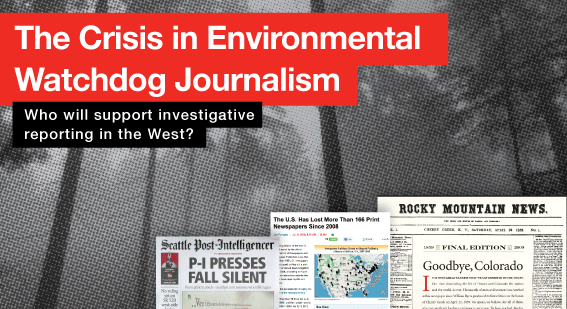
The Bill Lane Center for the American West, Stanford University

November 2010 Symposium: “The Crisis in Environmental Watchdog Journalism”
John S. Knight Fellowships
Two months after the Seattle Post-Intelligencer published an investigative series about questionable timber-harvesting practices by the Boy Scouts of America, the P-I ceased print operations and laid off the majority of its staff. Lewis Kamb, the lead investigative reporter on the series, was full of ideas for follow stories. But he was out of work.
Nonetheless, the project survives as an example of the impact such reporting: his series, “Chain Saw Scouting,” won the $5,000 Knight-Risser Prize for Western Environmental Journalism, sponsored by the John S. Knight Journalism Fellowships and the Bill Lane Center for the American West.
Kamb talked about his series and the importance of such investigative reporting at the annual awards symposium, “The Crisis in Environmental Watchdog Journalism,” held Nov. 17 at Stanford University.
Investigative reporting takes time, energy and resources, Kamb said, and that’s harder to do in the current news media environment. Even before the downsizing of mainstream media reached warp speed — the P-I was among 166 U.S. newspapers closed since 2008 — investigative reporting was a “rare luxury,” he said.
The Knight-Risser Prize and Symposium are intended to celebrate and encourage the kind of journalism represented by Kamb’s series, which was reported and published in the Post-Intelligencer and five other Hearst Newspapers.
“The Bill Lane Center and Knight Fellowships and graduate journalism programs at Stanford are deeply concerned about changes in environmental journalism, and actively concerned about how investigative journalism can survive,” said Jon Christensen, executive director of the Bill Lane Center.
There’s reason for hope, according to symposium panelists: Kamb, now writing for The News-Tribune in Tacoma, Wash.; Mark Katches, editorial director of CaliforniaWatch.org; Ann Grimes, director of Stanford’s Graduate Journalism Program; and Elizabeth Titus, editor-in-chief of The Stanford Daily. Knight Fellow Evelyn Larrubia was the symposium moderator.
As examples of reasons for optimism, panelists cited new reporting tools, a profusion of original news venues, new funding methods and new partnerships between non-profit start-ups and universities and surviving newspapers.
“What we’re seeing is a whole new crop of outlets where new journalists can work,” said Grimes, citing a recent report that counted 60 new investigative outlets since 2006. “They’re doing good work, winning awards. It’s an exciting time. There are a lot of opportunities out there.”
Grimes likened the current media transition to the era of the “penny press” in the 19th century, when a proliferation of cheap, flashy newspapers supplanted the more staid journals of the time.
“To a certain extent, they had lots and lots of what we might call blogs out there: free or costing a penny, each flacking its own political point of view,” she said. “Journalism as we know it today, with its rules of objectivity, came out of that era as a new business model. People got sick of reading one person’s opinion.
“Now we’re back in a bifurcated era. And maybe another promising business model will emerge out of that.”
New journalism tools and some obvious and some unlikely collaborations are rapidly redefining how journalism is pursued, produced and proliferated.
New software is making it easier and more efficient to capture and mine public records and other data, allowing smaller staffs to tackle larger projects. Data visualization is a focus of the Bill Lane Center, and a key aspect of last year’s winning entry.
Some of this is propelled by the work of investigative start-ups online that are forging unusual alliances with other start-ups, universities and for-profit media. It’s a way to enhance credibility and distribution and gain traction.
Kamb plans to donate part of his prize to a Seattle-based nonprofit, Investigate West, as a way to launch a collaborative in-depth reporting effort just agreed upon with the News Tribune. “The editor loved idea but had never done a collaborative news effort before,” he said.
“For a smaller non-profit, the key is really getting a foot in the door with established media,” said Kamb. “It helps show they’re credible news sources. And without one, you can’t get a second one.”
That’s the approach Katches says has made CaliforniaWatch.org successful. In addition to foundation funding, it has sold its investigative pieces to as many as 80 publications. It gets some extra cash but mostly an audience that would have been impossible for a start-up.
“One of the significant inroads we’ve made is making sure our stories don’t just live on our own website. We’re very small so we can’t expect to make a big impact if people are only reading our site.”
Traffic is growing, he said.
“We’ve risen out of necessity,” said Katches. For example, some news organizations that had 400 staffers five years ago now have about 150 people, an amazing decline in resources. “Newspapers can’t do it themselves anymore so they’re opening up to partnerships.“
Another sign of hope for investigative reporting may be the determination and enthusiasm coming from the next crop of new journalists.
“We do still aspire to the classic long-form piece of work and go gaga when see one,” said Stanford Daily editor Titus. “There are so many opportunities to do our work and put it out there, not just daily but throughout the day.
“We’re chipping away at stories that we wouldn’t have been able to do in a different generation.”
Knight-Risser Prize Symposiums:
“When the Well Runs Dry: Confronting a Groundwater Crisis” 

January 2017 Knight-Risser Prize Symposium, January 25, 2017
“Breathless in Texas: Energy Production Puts Air at Risk” 

2016 Knight-Risser Prize Symposium, February 17, 2016
“Troubled Waters: Marine Life and the Threat of Ocean Acidification” 

2015 Knight-Risser Prize Symposium, February 25, 2015
“Deadly Measures: Uncovering a Little-Known Agency's Toll on Wildlife” 

2014 Knight-Risser Prize Symposium, February 5, 2014
“Wildlife, Wired: How Technology Is Changing Nature Reporting” 

2013 Knight-Risser Prize Symposium, February 20, 2013
“Adapting to Dry Times: The Role of the Media in an Increasingly Arid West ” 

2012 Knight-Risser Prize Symposium, January 25, 2012
“The Crisis in Western Environmental Journalism” 
November 2010 Knight-Risser Prize Symposium, November 17, 2010
“Visualizing the Environment” 
January 2010 Risser Prize Symposium, January 27, 2010
“Climate Change Hits Home”
December 2008 Risser Prize Symposium, December 3, 2008
“Environmental Fallout of the Cold War” 
March 2008 Risser Prize Symposium, March 13, 2008
“Water in the West: 21st Century Challenges in a 19th Century Legal Framework” 
2005 Risser Prize Symposium, November 1, 2005
Kamb plans to donate part of his prize to a Seattle-based nonprofit, Investigate West, as a way to launch a collaborative in-depth reporting effort just agreed upon with the News Tribune. “The editor loved idea but had never done a collaborative news effort before,” he said.
Texas Tribune, ProPublica

The Desert Sun and USA Today

CPI, InsideClimate News, The Weather Channel

The Seattle Times

The Sacramento Bee

High Country News

5280 Magazine

Seattle Post-Intelligencer

What Went Wrong?
The Seattle Times

San Antonio Express-News

The Los Angeles Times

High Country News



